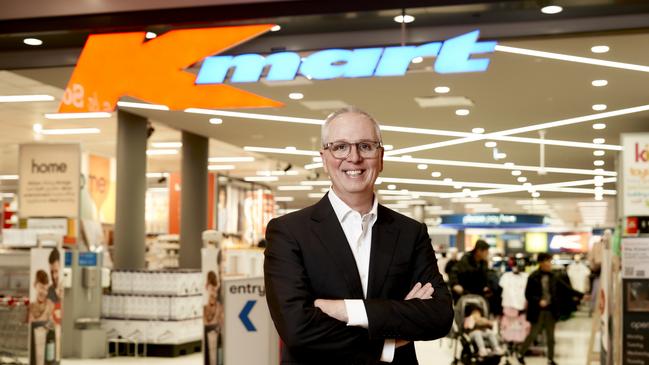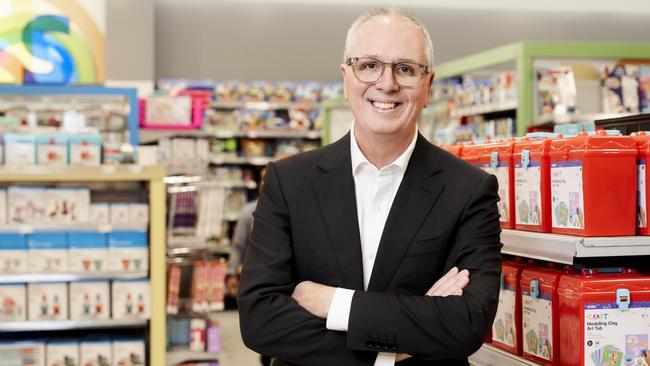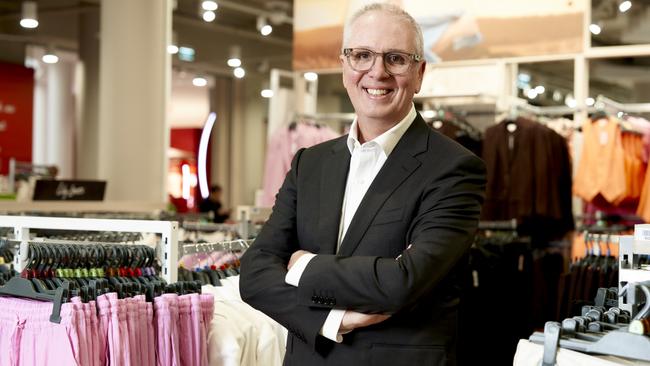‘I love accountability’: Ian Bailey, the engineer who got Kmart on Target
Ian Bailey was never a retail expert, so he learned to put the right people in the right roles and empower them, which has underpinned the success of a $10bn dual-brand retail giant.

Ian Bailey’s introduction to discount department store retailing was brutal.
It was 2006, and Bailey transferred within the Coles Group from his executive role at Officeworks to be chief financial officer of the then embattled Kmart.
“The first couple of years, it was pretty bad. We were part of Coles Group and it was much more anarchistic,” he says.
“It was a pretty brutal culture to work within. A fragmented leadership team in a business that wasn’t performing.
“I learned a lot. My confidence we were going to dig ourselves out of a hole was pretty low.
Half the week was spent on looking at what worked and didn’t work in last week’s promotion.
“We were just completely out of shape. It is soul destroying being in a business that is going nowhere. We worked hard but we couldn’t get anywhere.”
He never considered quitting given he’d been promised a future executive role within the Coles Group.
His patience was rewarded a year later when Wesfarmers pounced on Coles with a bumper $22bn takeover and for the next eight years he worked hand in hand with his boss, Guy Russo, to turn Kmart around.
They cut costs, product lines, boosted short inventories and invested in lower prices, which delivered better foot traffic and more sales.
It laid the foundations for Bailey’s ascension to succeed Russo in 2016 – and two years later he took charge of Wesfarmers’ Kmart Group division, which encompasses the Kmart and Target businesses.
In August this year, the back offices of both chains were merged to create a $10bn dual-brand retail giant, with Bailey at the helm.
Yet he will never forget the lessons of those dark, early days.
“When things work, everything just works and it happens. When things don’t work, you really see what is flawed,” he says.
“I learned the importance of alignment and values. You realise all of the politics that goes on is just a waste of energy.
“Back then there also was this passive resistance. The people who worked in the business for a long time had no faith in the leadership, so their decision was to ignore.
“One of our first moves when Wesfarmers took over was to tackle the culture. It was so obvious to me that nothing we could do as leaders could influence the actions of some staff.
“So we went after culture. It was so powerful. We tapped into the right things for the team.

The performance improvement was immediate.”
Today, having a culture and values owned by its 50,000 staff has become the secret to the ongoing success of Kmart, which was the standout division in Wesfarmers’ annual results in August.
Under Bailey’s leadership, Kmart has shifted from being a traditional discount store chain to a hybrid retail model which is as much about product development as it is about retail.
“What is different about us is strategic clarity; we have incredible clarity about who we are and what we have to do,” he says.
“We are simply about families, everyday items and lowest price. Those three words have been part of our strategy since 2009.”
Kmart’s values have only changed once since 2008 – always focused on the customer, safety and integrity. They now include the terms “growing together” and “reaching higher”, the latter embracing better ways of doing business such as experimenting with artificial intelligence.
“There will be time in the next tow to three years when we need to change them again,” Bailey says.
His leadership mantra has also always been about getting the right people in the right roles, doing what they do best.
That draws from his experience of coming into retail late in life compared with many others in the sector.
Unusually for a top retail executive, he completed a bachelor of science degree in civil engineering and his first job was in accounting. When he joined Kmart as CFO, he was 40 years old.
“So I was never the expert. There was always someone who knew more about retail than me,” he says.
“So I never felt the pressure to be able to answer the questions. I didn’t have the experience so I had to bring something different.
“So I had to ensure I had the right people in the right roles answering the questions.”
“I think people want accountability, it gives them meaning in life and work. From a leadership perspective, we want to give people the space to go and do their thing.”
Taking risks is nothing to fear
Bailey hails from a working class family in North East London.
His father, who passed away years ago, worked most evenings fixing the printing presses on Fleet St. His mother ran the household and worked as a part-time secretary.
Money was never plentiful.
“It was always a battle for a better life,” Bailey says.
At the age of 18 he moved to Manchester to study engineering and when he left university he admits that he simply “didn’t enjoy work”.
“Accounting is desperately boring and I was working in an old-school chartered accounting firm. It was so rigid and rules based, I found that structure difficult,” he says.
He started hunting for something more satisfying, which resulted in him changing jobs and companies almost every year for the next eight years.
He initially worked for the Royal Mail, then a private equity firm in healthcare in London, and a start-up technology company which sent him to Australia on secondment for a year in the mid-1990s as its local general manager, before the business went broke.
His next role was with US telecommunications giant MCI, which was acquired by WorldCom in 1998.
“I was always happy to take risks. I went through a period I would describe as one of meteoric rises and then spectacular crashes,” he says with a smile.
But the job hopping introduced him to the word that now has pride of place in his vocabulary: accountability.
“I wouldn’t have used that language back then because I probably would not have known how to articulate it, but I liked that I was going to be valued on the work that I did,” he says.
“Quite quickly I worked out that actually I wanted to run things. Because I had a financial qualification, the easiest route was to go through the CFO (chief financial officer) path.”
In 1999 he applied for permanent residency in Australia and spent two years with PwC in a sales role.
“It was really good because it helped me get to know the Australian corporate landscape and introduced me to helpful people,” he says.
“One said there was a job going at Officeworks so I applied and ended up the getting the job as CFO in 2002.”
There have been times in his career when not having retail in his blood has been confronting.
He will never forget a chaotic marketing meeting, during his early days as Kmart chief operating officer, which had been convened to decide what product would go on the front page of the latest glossy sales catalogue.
A bunch of loud, aggressive buyers were pitching hard for the slot.
“There was no process. My job was to be judge and jury and I remember thinking ‘How on earth can I do this week in week out? Surely there must be someone else who is good at this’,” he says.

“I figured out the process, the people and the accountabilities. I got someone to take the decision.”
Bailey has never been comfortable in an environment of high testosterone and aggression.
He has worked with plenty in retail who swore and thumped the table to get their results, but he doesn’t see the point.
“I am calm in pressure situations because it is my job to be. If I’m going to push all this accountability on the team, it is my fault if things don’t work because I haven’t set it up right,” he says.
But what has surprised him in senior roles is that sometimes an offhand, casual comment about an issue can suddenly seemingly become law across the organisation.
He recalls a store visit when he remarked to a staff member about the lack of separation between apparel racks.
During his next round of visits a few weeks later, a store staff member joked that they had “heard about the Ian rule” on racking.
“It taught me that I have to be really careful what I say,” he says.
Family happiness front and centre
It is called Tory, a self-navigating inventory scanning robot which allows Kmart to quickly top up products on the shop floor and make price changes, freeing up staff to focus on product development.
It is one of a number of technological improvements delivering better customer experiences and improved products.
“A lot of retailers have got lost in tech. We were at risk of it for a while. When it comes down to it, we just have to deliver great product for customers,” Bailey says.
“We have to use all these digital and data tools to deliver that outcome.”
But tech has also got Kmart into trouble. Earlier this month it was fined $1.3m by the Australian Communications and Media Authority after sending more than 200,000 emails that breached Australia’s spam laws.
Kmart said at the time that it was working hard to make changes to ensure such breaches did not happen again.
Going forward Bailey sees great opportunities to use Kmart’s home brand, Anko, to spearhead its international expansion push into Asia. Anko is already selling direct to consumers in India and has a partnership with Canada’s Hudson Bay.
Bailey now works hard to achieve a better work-life balance after learning the hard way in 2012 when Wesfarmers sent him to Harvard for two months.
“Eight weeks is a long time away from home when you have a four year old. My wife felt that and she told me about it in no uncertain terms. It was a dumb move in hindsight,” he says.
She and their two daughters now happily shop at Kmart. Bailey jokes they previously did so “under duress”.
His 15 year old is a fan of the new youth range, where she can buy cargo pants for $20 instead of $60.
“My wife, Nicole, is a great organiser; one of the great planners of the world. So she is pretty happy with our storage range,” Bailey says with a broad smile.
“Every time I go home I find another little tub and things that have been organised within it.”
He is a keen cyclist and in 2021 took part in the Noosa Classic Bike Ride on the Sunshine Coast.
His mother is still going strong back in London at the age of 85.
“She is still fiddling around with the garden, moving concrete slabs when she shouldn’t be, so is still energetic and super sharp,” her son says. He gets back to see her at least once each year.
Bailey says the best piece of career advice he ever received was from a Canadian executive when he was working for MCI in London.
“‘You have to be learning at one million miles and hour’, he told me; so if anyone asks me my number-one tip for life, you need to be learning like crazy. If you are not, you have to change,” he says.
But Bailey also lives by an unusual philosophy that the best advice comes from within.
“Advice is everywhere but you have to be tuned in to hear it. The best advice comes from yourself because you are with yourself all the time,” he says.
“When you get advice from other people, they are only seeing you in a subset of your life.
“I am accountable for figuring out things more than anybody else is at telling me. Then my accountability is to listen really hard.
“Because sometimes people tell you things and it is easy not to hear them.”






To join the conversation, please log in. Don't have an account? Register
Join the conversation, you are commenting as Logout